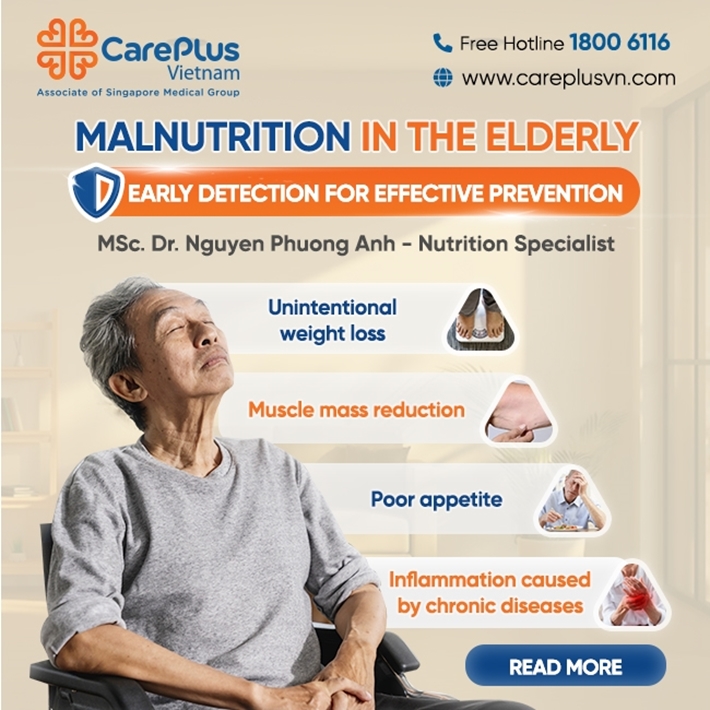MALNUTRITION IN THE ELDERLY – EARLY DETECTION FOR EFFECTIVE PREVENTION
Malnutrition in the elderly is a “silent enemy” that weakens the immune system, leads to muscle loss, slows recovery, and increases the risk of mortality. Learn how to detect early warning signs and protect your loved ones with guidance from CarePlus doctors in this article.

6/25/2025 4:49:06 PM
⏱ Malnutrition in the elderly is a “silent enemy” – quiet but capable of causing serious health consequences. Many people mistakenly believe that only those who are underweight can be malnourished. In reality, this condition can affect individuals who appear to have a normal or even overweight body type.
👉 Without timely detection and intervention, malnutrition can weaken the immune system, cause muscle loss, impair mobility, slow recovery from illness, and even increase the risk of death.
✅ Let’s explore the early warning signs of malnutrition in the elderly with MSc. Dr. Nguyen Phuong Anh - Nutrition Specialist at CarePlus International Clinics.
1/ Why is malnutrition dangerous in the elderly?
Malnutrition in older adults is not just about weight loss—it is a warning sign of various health risks, such as:
▪️ Muscle loss and weakness: Aging naturally leads to muscle mass reduction. Malnutrition accelerates this process, causing fatigue, increased risk of falls, reduced ability to perform daily activities, and eventual loss of independence.
▪️ Weakened immune system: Nutrient deficiencies impair immunity, making the elderly more susceptible to infections, recurring illnesses, and slow wound healing.
▪️ Poor recovery from illness or surgery: Malnourished individuals recover more slowly, are more prone to complications, and often face prolonged hospital stays.
▪️ Higher risk of mortality: Especially in those with chronic conditions such as cardiovascular disease, diabetes, or chronic obstructive pulmonary disease (COPD).
2/ Signs of malnutrition in the elderly
🔔 Don’t wait until your loved ones experience drastic weight loss to recognize malnutrition. It may have been developing silently for some time. Watch for these early signs:
🔺 Unintentional and uncontrolled weight loss: Weight loss occurs even without dieting or increased physical activity. Alarmingly, many overweight seniors may consider this a positive sign and overlook it.
🔺 Low Body Mass Index (BMI): For Asian populations, the recommended BMI is at least 18.5 kg/m² for those under 70 and at least 20 kg/m² for those over 70.
🔺 Muscle mass reduction: This is a key indicator of malnutrition but is often overlooked.
Many assume muscle loss only shows as visibly thinner limbs, but in seniors, subcutaneous fat may mask this condition. A non-invasive and accurate way to assess muscle and fat levels is through body composition analysis using an InBody analyzer.
🔺 Reduced appetite or food intake: A noticeable decline in food consumption or appetite is an early sign of malnutrition. This may be accompanied by nausea, stomach discomfort, difficulty chewing or swallowing, bloating, or indigestion.
🔺 Chronic inflammation related to underlying diseases: Many associate “inflammation” only with visible symptoms like swelling or pain. However, chronic low-grade inflammation is common in elderly individuals with chronic diseases such as diabetes, COPD, cardiovascular disease, fatty liver, chronic kidney disease, or cancer.
Though it may not cause obvious pain, this ongoing inflammation accelerates muscle breakdown, leading to rapid and significant muscle loss. As a result, the elderly may appear well-fed but are actually malnourished and increasingly weak.
⛔ Don’t ignore seemingly small changes in the elderly, such as poor appetite, slower movement, persistent fatigue, or unexplained weight loss. These could be early signs of malnutrition. Early detection allows for much simpler and more effective intervention than treating advanced muscle loss and frailty.
✅ Annual nutrition check-ups, including InBody body composition analysis, dietary assessments, and chronic disease evaluations, are simple but powerful tools in preventing malnutrition—especially in seniors with long-term medical conditions.
If you notice signs of malnutrition in your elderly loved ones, don’t hesitate to contact CarePlus. Our team of experienced nutritionists can provide accurate diagnoses and tailor-made diet and exercise plans.
👉 Please contact our free hotline 1800 6116 to book your appointment today!
CAREPLUS INTERNATIONAL CLINICS
Associate of Singapore Medical Group
Hotline: 1800 6116
Email: info@careplusvn.com
Fanpage: CarePlus Clinic Vietnam